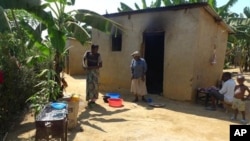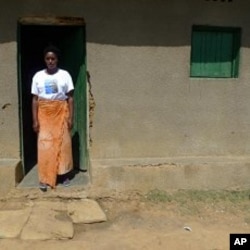It's been more than 16 years since the 1994 genocide in Rwanda that left about 800,000 Tutsis and moderate Hutus dead. Rwandan President Paul Kagame, who was re-elected in August with 93 percent of the vote, says now there are no longer Hutus and Tutsis in Rwanda, only Rwandans. As a test of how well the different ethnic groups can live together, victims and perpetrators of the genocide are living side-by-side in a small community known as the Reconciliation Village.
Jaqueline Mukamana was 16 years old on April 7, 1994. It was the day after the plane carrying the presidents of Rwanda and Burundi, both Hutus, was shot down over the Rwandan capital, sparking the genocidal killings throughout the country for about 100 days. It's a day she'll never forget.
"That very day, I was not at home," she says. "My parents had sent me to get milk from where we graze our cows. When I came back,I found all of my family members dead."
A group of her Hutu neighbors had formed up in the village center. They went to her house and started the killing.
In all, 12 of her family members were hacked to death with machetes and swords. She fled to the fields to hide and then left for neighboring Burundi to survive the genocide.
In 2005, Mukamana was selected to move into a Reconciliation Village, located some 30 kilometers south of the Rwandan capital Kigali. The village is funded by the non-profit Christian organization Prison Fellowship International, under the condition that survivors and perpetrators of the genocide agree to live together peacefully. The founding members of the community voted on who could live there, typically choosing families most vulnerable to poverty or illness.
Now, Mukamana lives right next door to some of the people who slaughtered her family.
Forty families live in the Reconciliation Village tin-roofed concrete and brick houses that they built themselves. The government provided the land and some organizations like Norwegian Church Aid helped pay for the homes.
But before the killers could become residents, they had to ask forgiveness.
She says the soldiers brought the perpetrators to meet Tusis at the local government office. "They told us that they were the ones who killed our family members. From there, there was no problem," she says. "They asked forgiveness, and we forgave them."
They showed Mukamana where they buried her family so the victims could be given a proper burial.
Children of both ethnic groups beat drums and sing in the Reconciliation Village. Mukamana herself has three children today who play with the children of the perpetrators. She said the country has reached unity and reconciliation. In the Reconciliation Village, she says she sees the people who killed her family on a regular basis.
We interact, she says, they even come and visit me and we talk about life in the village. We don't have any problems.
Fredrick Kazigwemo didn't kill Mukamana's family members but he did kill other Tutsis during the genocide. He and about 200 other men in his village formed up and killed their victims with different weapons - swords, machetes and even Rwandan traditional spears.
"Me, I used a machete," he says. "During the genocide, I went to hunt for the Tutsis so that we can kill them because the former government told us that they were enemies so they should be killed. One day his group killed seven people."
Kazigwemo said now he believes in unity and love. He blames the genocide on bad leadership.
He says it was political propaganda that Tutsis are bad people so they should be killed. Even in the school, they taught us those things, he says. Hutus was told to make Tutsis stand up so that we should know them. So they wanted to eliminate Tutsis. But luckily enough, he says, god protected them. They were not all killed.
Kazigwemo arrived in the Peace Village in 2006 after spending eight and a half years in prison for his crimes.
He got out of jail early thanks to a 2003 presidential pardon. Crowded prisons and an overwhelmed justice system led the government to release tens of thousands of perpetrators.
While in prison, Kazigwemo started writing letters to the victims' family members. After he was released, he went to their homes and asked for forgiveness in person.
A farmer now, the 41-year-old man and his wife have four children. Most of the Reconciliation Village residents work as farmers so they work together in the fields. They have agriculture and livestock cooperatives. The men do carpentry work together and the women make handcrafts.
Pastor Deo Gashagaza, the Executive Director of Prison Fellowship Rwanda, said reconciliation has to involve economic initiatives like these.
"This helps because reconciliation without acts, without any initiatives for economy is zero. We need to see how reconciliation goes with economy because when the genocide had taken place there is destroying the economy also. Many things were destroyed, like cows, like small businesses everything. Houses were destroyed," he said.
The community is still going through economic challenges.
Survivor Janette Mukabyagaju is the President for Board of Advisors in the community. She was 17 years old during the genocide and, except for one brother, lost her entire family. She said the problem now is not ethnic.
"We don't have conflicts because we consider ourselves all Rwandans, not Hutus or Tutsis. The challenges we face are about poverty. We don't have sources of income and even you can see we don't have power here. So it's all about poverty," she said.
Gashagaza, who founded the Reconciliation Village, says the village wasn't designed to help the genocide survivors and perpetrators with food. The pastor said residents are from this area so they can provide for themselves.
He added that the Reconciliation Village is building the hope of the nation.
"This is a good thing to see because reconciliation is now a good success. But we are still continuing to do that because it's a process. It's not automatic, one thing you can do in one day. It's a journey. But there is a hope for this program," he said.
There are four such Reconciliation Villages located around Rwanda.





